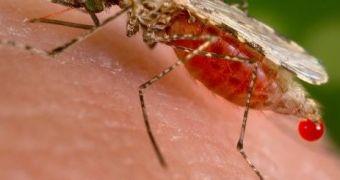Researchers have discovered the way that the immune system of a mosquito defeats the malaria-causing parasite.
The Anopheles mosquito is the insect that transmits malaria to people and in some cases it dies because of the disease too, but most of them are able to fight off the infection.
The immune system of a mosquito does not elaborate different strategies for different disease, instead it reacts the same for everything, and because it is able to destroy Plasmodium, the single-celled microbe that causes malaria, it is rather effective.
Vector biologist Janneth Rodrigues and her colleagues at the National Institute of Allergy and Infectious Diseases in Bethesda, Maryland, wanted to find out how did the mosquito's immune system worked on the malaria-causing cirus.
To do that they fed two groups of mosquitoes mouse blood containing Plasmodium, Science NOW reports.
One group became infected and the other did not, as it was placed in a room with a temperature hotter that what the Plasmodium needed to grow.
A week later when scientists fed both groups the infected blood again, the infected group was better at killing the virus.
The researchers analyzed he immune system of the mosquitoes and found two weapons: granulocytes and bacteria.
In the preinfected group, scientists found three times as many granulocytes than in the uninfected group, because when these immune cells detect a foreign body in the blood, they will kill it of have other cells do the job.
But granulocytes cannot work alone, so the team thought that bacteria might also be involved in the anti-Plasmodium response.
They observed that the parasite weakens the walls of the mosquito's gut, and gut bacteria is spreading in several parts of the body.
This triggers more “baby immune cells” to start turning into granulocytes, which strengthens the immune system and fights the Plasmodium parasite, says vector biologist and co-author Carolina Barillas-Mury.
Of course this was a theory that needed to be tested so the scientists repeated the experiment but gave the mosquitoes antibiotics that wipe out their gut bacteria.
As a result, the preinfected group did not rise its granulocytes level so just as many of its members died as did those in the control group.
After these observations, scientists thought of making a malaria vaccine for mosquitoes so they injected some of the insects with the serum from mosquitoes exposed to Plasmodium, after removing the granulocytes from it.
These mosquitoes had less-intense Plasmodium infections and immunity rates grew by 40% after eating infected blood.
Understanding mosquitoes resistance to malaria has its advantages says vector biologist Marcelo Jacobs-Lorena of John Hopkins University in Baltimore, Maryland.
“Since the mosquito is an essential link for transmission to occur, this is important if we want to eliminate malaria from the mosquito.”
The team reported the findings in the September 10 issue of Science.

 14 DAY TRIAL //
14 DAY TRIAL //